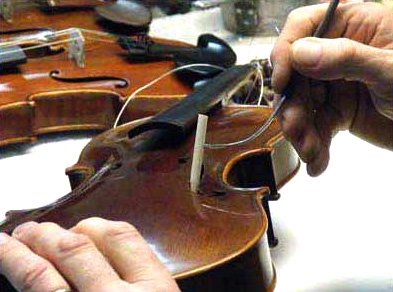
What happens when two friends stop talking to each other? Has something damaged the relationship? Is the one so preoccupied they don't give the other a thought, so that the other feels neglected, slighted, offended?
The equivalent spiritual experience is sometimes called the dark night of the soul, or the wilderness experience, or called for what it is, a sense of the absence of God.
In the poem "Denial" Herbert is not sure who has stopped talking to whom. What's beyond argument is that prayer isn't working, God's ears are silent, there is no hearing, and he is now anxious and agitated by what begins to feel like God has blocked him, perhaps even unfriended him.
Those whose faith is deeper than superficialities too easily settled for, and for whom love of God and trust in God arises out of the struggles, ambiguities and contingencies of human existence, will know times when God's silence is disconcerting. Purposeful silence can at times be scary, and even in the strongest of relationships can call into question the foundation trust of our lives.
Why the silence? What makes God abscond? Was it something we said, did, didn't do? Or perhaps it has nothing to do with us; it's just that God is not obliged to nurse our neuroses! Whatever the reason for God's apparent unresponsiveness, the experience forces us to face up to the latent utilitarianism of a faith that depends on perceived benefit, rather than loving God for who God is, regardless.
Herbert can be impressive, though, in his persistence, 'crying night and day', 'all day long', and he is suffering for it. To persist in prayer when there is no discernible response, to go on persuading when there is no offer of meeting half-way, to openly complain and lay yourself open by saying how you feel, that's to make the spiritual equivalent of a wronged person's impact statement. It takes a particular quality of faith.
Such faith is formed by more than intellectual assent, and sustained by more than emotional comfort. It requires relational resilience, long-suffering allegiance, and a trust born out of hard won and hard held knowledge that, eventually, there will again be a union of hearts and restored communion and communication. For now, there is the astringent reality that God is not our 24/7 carer; God's absence and silence are reminders that we do not control God, grasp God, or have rights with which to coerce God's co-operation.
Mark Oakley says this well: "As a defence against our idolatry, he often becomes silent so that our certainties are dismantled back into faith and we learn to speak the foreign language of God again." (My Sour Sweet Days, Page 47)
Now read Herbert's trustful complaining. The next post will explore the images of the last two stanzas.
Denial
When my devotions could not pierce
Thy silent ears,
Then was my heart broken, as was my verse;
My breast was full of fears
And disorder.
My bent thoughts, like a brittle bow,
Did fly asunder:
Each took his way; some would to pleasures go,
Some to the wars and thunder
Of alarms.
As good go anywhere, they say,
As to benumb
Both knees and heart, in crying night and day,
Come, come, my God, O come!
But no hearing.
O that thou shouldst give dust a tongue
To cry to thee,
And then not hear it crying! All day long
My heart was in my knee,
But no hearing.
Therefore my soul lay out of sight,
Untuned, unstrung:
My feeble spirit, unable to look right,
Like a nipped blossom, hung
Discontented.
O cheer and tune my heartless breast,
Defer no time;
That so thy favours granting my request,
They and my mind may chime,
And mend my rhyme.
Leave a Reply